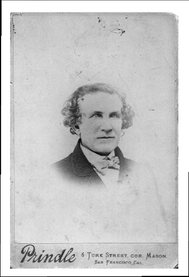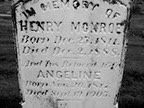

Henry Munro was possibly born on December 25th, 1807 in Inverness Scotland. A baptismal record from the Inverness Parish Church Record states that Captain John Munro of the 42nd Regiment and his spouse presented their son Henry to be christened on February 1, 1808. There is no name for the child's mother. If this is indeed, the son of John Munro and Ann Fraser, and the brother of John Munro then, since she is not named, we have to conclude that Ann Fraser may have been very ill or had died and that Henry was the youngest child in the family.
Henry died on September 11, 1888 and is buried in the Enterprise Cemetery near Ferndale, Whatcom County, Washinton, USA. His death record in Washington State indicates that he was born December 25, 1811 but the 1850 census provides an estimated birth year of 1808.
We don't know when Henry arrived in North America. A search of ship's arrivals in New York has yielded inconclusive results. He may have come to Canada with John and Isabella as early as 1830 or he may have come later on his own.
What we do know is that by the spring of 1840 he was established in Michigan City, La Porte County, Indiana and felt secure enough to marry. The marriage took place on April 4, 1840. His bride was Angeline Griffin [born November 26, 1917], the daughter of Daniel Griffen and Aletha Tucker. The Griffins came from a well known New York family. Census records tell us that the Griffens and their daughter, Angeline, were born in New York and that Angeline’s mother was resident in Michigan City from before 1850 to 1870. We have not found any records of the Tucker family but John Henry Munro’s family tree placed them in Pennsylvania. Be aware that the accuracy of John Henry’s tree is subject to question.
Griffin family records state that Daniel Griffin died in 1842 at the home of his son Edward in New York. “Eletheia” Griffin died in Chicago on February 9, 1871.
Henry, Angeline and their first four children are listed in the 1850 Indiana Census. Henry’s occupation is described as “Cabinet Maker” and he owns real estate valued at $400.00. In 1850 the occupations of his neighbors [on the same census page] included several farmers and a physician.
In 1860 Henry’s house was valued at $800.00 and his personal wealth had increased to $400.00 Also in the 1860 Census, Angelina’s mother, Aletha/Alatha/Aletheia Griffin was listed as living next door to the Monroes, sharing her home with her widowed sister . (The ‘ Monroe' spelling as opposed to 'Munro’ seems to have been adopted in Indiana.) Alatha was fairly well off with real estate worth 80 dollars and a personal estate of 1200.00. She was described as a widow,. She shared her home with another woman, perhaps her elder sister, Sarah Wapon, also a widow. No real estate or personal estate is attributed to Sarah in the census record.
Henry and Angeline had five children all born in Michigan City:
1. Alathea Ann M. Jan. 28, 1841 – 12 Sept. 1920.
2. John Henry, Jan. 10 1842 - April 24, 1937 (NOT John Henry of Busby!)
3. Daniel G., July 17, 1845 – 2 May, 1914
4. Ellen [Ella], 1851 – Nov. 1, 1929
5. George A., 24 September, 1858 – Jan. 22, 1929.
All the above except Alathea are buried in Enterprise Cemetery, Ferndale, Whatcom County, Washington. Alathea and her husband died in Bellingham.
In 1870, sons John and Daniel left for the West Coast and established themselves in the lumber business in Whatcom County, Washington. Henry, Angeline, and probably the girls, along with Allathea’s husband, Hugh John Crawford, followed in 1883 taking the water route around Cape Horn. Hugh John Crawford was a Baptist minister. Whatcom County records tell us they travelled by the ‘water route’ which probably means a clipper ship sailing from either New York or Boston. The almost five thousand miles trip would have taken about four months, crossing the equator twice and landing in San Francisco. After the long sea voyage they still faced an ardous trip North to Seattle and finally to Ferndale. Washington at the time had very little settlement or facilities for settlers of European origin. The following is an excerpt from the George Monroe story in Whatcom history:
When they came to Ferndale it was a typical frontier district and the only means of communication with the outside world was through the stage, which stopped at the town but once a week, or by canoe. The forests were filled with wild animals, and one day while walking on the road near their home they discovered a cougar but were not attacked.
After Henry’s death in 1887, Angeline lived next door to her son, George, who had become a prosperous business man.